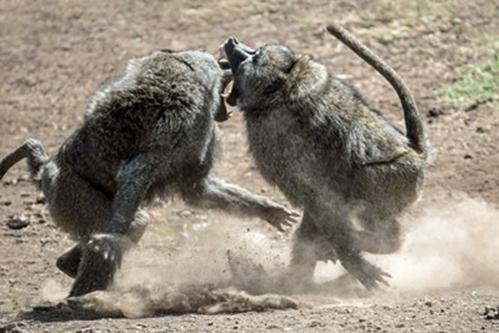Rival baboons fight over mates and territory, behavior that researchers say is important for evolution and survival most animal species. Photo by University of Bristol
Oct. 6 (UPI) -- In a paper published Tuesday in the journal Nature Communications, scientists argue that rivalries among animal neighbors could drive cognitive evolution, encouraging the development of 'Napoleonic' intelligence.
To date, the study of cognitive evolution among animals has focused on antagonistic and co-operative social interactions within groups -- the kinds of interactions thought to demand the development of so-called Machiavellian intelligence.
"Machiavellian intelligence is the House of Cards-style cunning that has evolved to get ahead in social politics within groups," senior Andy Radford, professor of behavioral ecology at the University of Bristol in Britain, told UPI in an email.
Machiavellian intelligence and the related cognitive processes help animals compete and cooperate with their intergroup peers and relatives.
"We argue that animals also need 'Napoleonic' intelligence, the more Game of Thrones-style sharpness necessary to triumph in a world packed with rival outsiders," Radford said.
According to Radford, many of the same types of cognition empower both Machiavellian and Napoleonic intelligence.
"Individuals benefit in both scenarios from a capacity to assess rival characteristics and intent in relation to their own characteristics, to be able to appraise and respond to developments during encounters, to change behavior based on previous encounters, to remember rivals, to process varied information and to make informed decisions," Radford said.
Perception, learning and memory all play a role in helping animals navigate interactions with both outside rivals and peers within their social group.
"However, the relative level of threat posed by group mates versus outsiders varies hugely between species, creating a major source of variation in selection pressures," Radford said.
This kind of variation, researchers suggest in the paper, could help explain the evolution of bigger brains across certain animal lineages.
All animals must find mates and compete for resources, but some species face greater competition from rival outsiders. Some birds, for example, pair up for life, while others must constantly guard against rival suitors.
As well, some species defend territories while others don't. And while some may defend relatively isolated and sparsely populated pieces of territory, others must defend highly contested pieces of territory, surrounded on all sides by rivals.
To better understand how these variations influence cognitive evolution, scientists will first need to more precisely quantify the variation in outside pressures faced by different animal species.
Researchers hope the paper will inspire scientists to study the impacts of outsider pressures on cognitive evolution. Radford suggests scientists can empirically test the phenomenon both within and between species.
"For a given species, individual variation in cognitive traits in relation to outsider interactions can be examined by testing cognitive performance on psychometric tasks or using neuroanatomical measures, such as brain size," Radford said.
"To compare between species, and to consider evolutionary trends, scientists can use what are called phylogenetic comparisons -- comparing the relationship between, say, brain size and outsider threat level whilst controlling for how closely related species are," he said. "Our prediction is that: the greater the threat presented by conspecific outsiders, the greater the cognitive ability."















